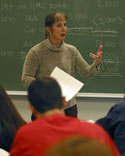
|

|
ECONOMICS
David L. McKenna Hall
206-281-2970
www.spu.edu/depts/sbe/
Douglas A. Downing, Contact Person
206-281-2890
FACULTY:
Bruce D Baker, Denise Daniels, Jonathan Charles Deming, Douglas Allan Downing, Albert M Erisman, Randal S Franz, Dan W Hess, Gary L Karns, William Kauppila, Herbert E Kierulff, Kenneth E Knight, Ryan Craig LaBrie, Grant LeRoy Learned, Henry L Petersen, Joanna Krystyna Poznanska, James F Rand, Kimberly M Sawers, Regina Pefanis Schlee, Gerhard Steinke, Ross E Stewart, Lisa Klein Surdyk, Jeffrey B Van Duzer, Kenman Wong
Economics is the study of the allocation of scarce resources among
competing uses. Many vital issues that affect human welfare are
studied in economics at SPU, with emphasis on a Christian perspective
on society’s decisions about how to organize the production
and distribution of goods and services. The economics major presents
the study of economics as one of the social sciences. The
program is structured to provide the widest latitude for the student
to select elective courses that will develop the student’s economic
interests. (See Business Administration for the economics
concentration in the business administration major.)
Requirements for the Major in Economics
70 credits
Students desiring to major in economics must follow the application
process described above. To be awarded a degree with a major
in economics, students must meet the major requirements in effect
at the time declaration of a major was made and have a minimum
of 35 credit hours in the major at SPU.
Note: Demonstration of computer competency is required. This is documented by
passing BUS 1700, or passing a competency exam covering the equivalent.
For students who will seek employment immediately after
graduation, an internship (ECN 4940) is recommended. Students
who plan to attend graduate school in economics are encouraged to
take these courses: MAT 1225 and MAT 1226 Calculus, MAT 1228
Series and Differential Equations, and BUS 3710 Optimization and
Statistics. Students completing these four courses may count these as 5 credits of electives in the economics major, and they may
waive the requirement for GEO 1110, POL 1110, or POL 1120.
Requirements for the Minor in Economics
As a compliment to majors such as political science, or for those preparing
for law school, the minor in economics can be a valuable addition to
the degree. These requirements also satisfy the requirements for a
teaching endorsement in economics. The requirements for the minor in
economics include a 20-credit core of ECN 2101, ECN 2102, BUS 4899,
and either ECN 3101 or ECN 3102, followed by 10 elective credits in
ECN or other approved coursework. Formal declaration of the minor is
required. Acceptance is based upon an application to the School of
Business and Economics with a minimum cumulative GPA of at least
2.70 in a minimum of 45 quarter credits of coursework. Application to
the minor can be made here.
Need to know when a course is being offered? Click here for the 2006-2007 Time Schedule.
 Print Degree Requirements
| Print this Page
Print Degree Requirements
| Print this Page
|